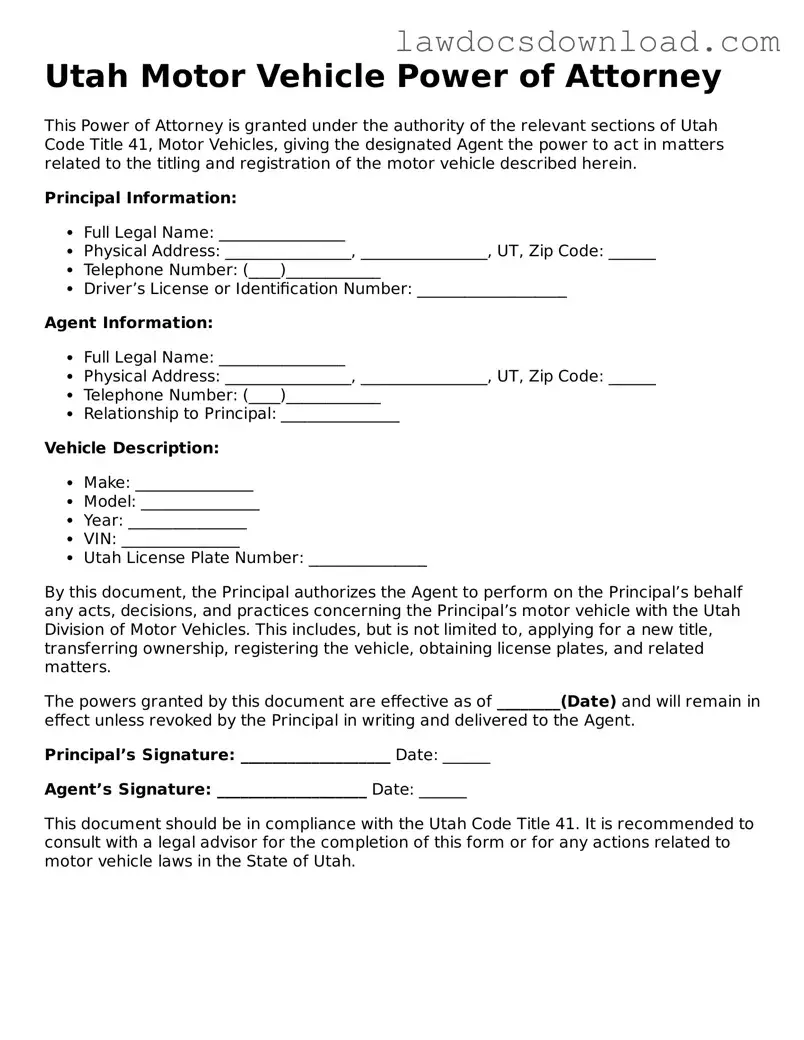The General Power of Attorney form is akin to the Utah Motor Vehicle Power of Attorney, as both authorize an individual, known as the agent, to make decisions and take actions on behalf of another, known as the principal. The primary difference lies in the scope of authority granted; while the Motor Vehicle Power of Attorney is specific to decisions and actions regarding a vehicle, the General Power of Attorney encompasses a wide range of the principal's affairs, including financial and real estate transactions.
Similarly, the Durable Power of Attorney document shares commonalities with the Utah Motor Vehicle Power of Attorney by allowing an individual to appoint an agent to manage their affairs. The distinct feature of the durable variant is its retention of the agent's authority even if the principal becomes incapacitated, contrasting with the more limited, purpose-specific focus of the motor vehicle power of attorney.
The Limited Power of Attorney form provides another parallel, specifically allowing an individual to grant an agent authority to perform certain acts or functions. Like the Motor Vehicle Power of Attorney, it limits the agent’s powers to specific situations or tasks, though it is not confined solely to vehicle-related matters, illustrating its broader applicability across various contexts.
The Health Care Power of Attorney is relevant yet distinct from the Utah Motor Vehicle Power of Attorney. It permits an individual to designate an agent to make healthcare decisions on their behalf, potentially including life-sustaining treatment choices, contrasting with the motor vehicle form’s focus on property transactions. Both, however, are premised on the foundational idea of representing another's interests in critical areas of their life.
Financial Power of Attorney documents are similar to the Utah Motor Vehicle Power of Attorney in that they empower an agent to handle the financial matters of the principal. While the Motor Vehicle Power of Attorney deals specifically with tasks related to a vehicle, such as registration or sale, a Financial Power of Attorney covers a broader range of financial activities, including banking, investments, and other financial transactions.
The Real Estate Power of Attorney shares similarities with the Utah Motor Vehicle Power of Attorney by authorizing an agent to act on behalf of the principal in matters relating to property. However, while the Motor Vehicle Power of Attorney focuses on vehicular transactions, the Real Estate Power of Attorney pertains to buying, selling, or managing real estate properties, showcasing its broader property management application.
A Child Care Power of Attorney parallels the Utah Motor Vehicle Power of Attorney in allowing parents to grant an agent authority to make decisions regarding their child’s welfare in their absence. This contrasts with the vehicle-centric nature of the Motor Vehicle Power of Attorney, highlighting its unique application in safeguarding children’s interests.
The Tax Power of Attorney, another related document, enables an individual to appoint an agent to handle their tax affairs, including representation before the tax authorities. This is akin to the Utah Motor Vehicle Power of Attorney, which allows for representation in vehicle-related matters, although the Tax Power of Attorney is specifically focused on tax-related transactions.
The Revocation of Power of Attorney form serves as an essential counterpart to the Utah Motor Vehicle Power of Attorney. It allows an individual to formally cancel a previously granted Power of Attorney, effectively withdrawing the agent’s authority. This document underscores the principal's control over their representation, regardless of the Power of Attorney's specific type or scope.
Lastly, the Advanced Healthcare Directive is similar to the Utah Motor Vehicle Power of Attorney in that it involves planning for future actions on one's behalf, specifically concerning healthcare decisions at the end of life. Unlike the Motor Vehicle Power of Attorney, which deals with property transactions, the Advanced Healthcare Directive focuses on medical and end-of-life care preferences, demonstrating its specialized use in healthcare planning.

